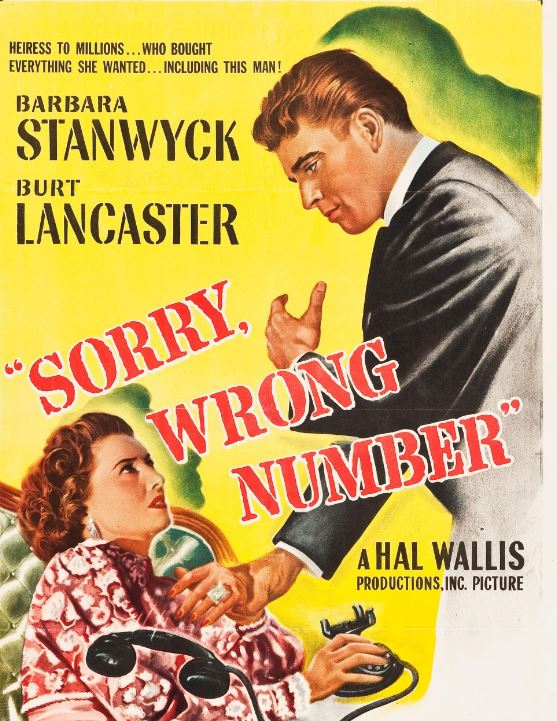
Anatole Litvacks Sorry, Wrong Number is a rapid-fire, nasty little thriller that even Hitchcock could love; the sort of film that presents an impossible premise (bed-ridden wife overhears murder plot over the phone and yes, the plot involves that very woman) and yet remains utterly believable throughout. The film works primarily because Barbara Stanwyck, always seeming to be on the edge of administering a fiery tongue-lashing, is so damned unlikable that we root for what we suspect to be transpiring before us.
Often a film will give us a sympathetic hero mixed up in a series of events beyond his understanding, but Stanwyck’s Leona Stevenson is such a vile beast that we can fully appreciate why her exhausted husband would want to kill her. And when he succeeds, well, we cackle with delight because so few films are willing to give us what we want when that desire is based in pure bloodlust.
Burt Lancaster is Henry, the ambitious, no-good bum of a husband in question, who plots his wife’s demise (in a series of flashbacks) because he needs money to finance his schemes (here involving stolen drugs, though the legal kind). She’s the type of dame whos’ better off dead anyway, or at least one exchanged for a healthy insurance payoff. Henry married into this family of horrors, and while we feel bad that he’s locked in its clutches, we never really care if he gets away with it. In a sense, the best of all worlds would be to have Leona butchered and Henry arrested, then cruelly sent to the gallows for a righteous exit. And yet, his survival might be an emotional kick as well, for in this world, everyone is a liar, a thief, and a scoundrel, and living with such burdens might be all they really have to keep them going.
Again, Leona is the whole show. She’s one of those women we always expect from the 1940’s — rich, well-dressed, exotic, and crazy as a shithouse rat — largely because her wealth has given her nothing but time to spend in fancy bed gowns. The idle rich, transformed into objects of envy in later decades, were always a bit pathetic in the cinema of this age, especially after a thorough acid bath at the hands of a dead-eye populist like Frank Capra. The moneyed set, because they have nothing else in their bellies but the lust to make even more money, are at the very least eccentric, and usually hypochondriac and dangerously violent. Leona stands for them all, and therefore must be punished.
The cast is uniformly excellent, the dialogue crisp and involving, and the atmosphere so engaging that we don’t really care that we know where it’s going. And yet, the final shot (and the use of the title as dialogue) was a mild stunner, as I’m used to shaggy dog theatrics that undermine everything that came before. Thankfully, the screenplay took a blissful chance. Love is an instrument of manipulation, money rules the kingdom, and those who deserve death get it nice and hard. Now that’s a night at the movies.